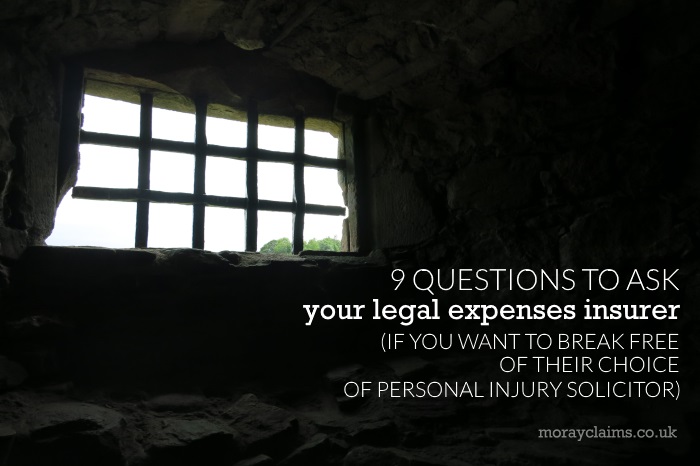
In other articles, we have discussed how legal expenses insurance can help minimise the cost risk to you if you need to make a personal injury claim for compensation.
The term “legal expenses insurance” can include both before-the-event (BTE) insurance and after-the-event (ATE) insurance.
With ATE insurance, the insurance policy is taken out after the accident in order to cover the risk of having to pay the opponent’s legal costs (for example, if you raise a court action but the claim fails and you lose).
BTE insurance covers against future legal costs but was in place before the event which gave rise to the claim, such as the accident which has caused the personal injury for which you need to claim compensation.
BTE insurance generally limits your freedom to choose your own legal representative because claimants are directed to use firms of solicitors which are on the BTE insurer’s approved panel.
Panel firms may be located a considerable distance from your home, especially if you live in Moray or anywhere else in the north of Scotland.
Firms of solicitors are selected for the BTE panel after a closed bidding process, intended to ensure that insurers are exposed to the lowest possible risk. In return for limiting their costs and ensuring that the cases are dealt with efficiently, panel firms are guaranteed a flow of work from the BTE insurer. The insurer will also impose a service level agreement and expect to audit the work of the panel firm periodically. The BTE insurer may also expect to be paid a referral fee for each case the panel firm receives.
Many non-panel solicitors object to these features (including us, the solicitors at Moray Claims / Grigor & Young LLP). Being able to use the services of a specialist, local solicitor is most likely to be in line with your best interests for a personal injury claim.
This article is about before-the-event insurance.
If you would like to be able to instruct your own choice of solicitor, rather than the one your insurers would like to impose on you, what are the questions you need to ask?
- Does the legal expenses insurance cover you in any claim for compensation for the injuries and other losses you suffered as a result of the accident?
- If it does, will the policy – if necessary – cover the legal costs of the solicitor you want to instruct?
- If your solicitor wants to instruct opinions from medical experts – which is usually necessary – will they have to get permission from the legal expenses insurers first of all? This is usually a requirement – and it will apply to the use of other “helpers”, such as advocates/counsel.
- Will the insurers meet the cost of outlays/disbursements as the case goes along or will they expect you (or your solicitor) to fund them up to the point where your case reaches its conclusion?
- Do the insurers have any requirements about the status or level of qualification of the fee earner dealing with the case day-to-day? (Not every solicitor’s firm will only have experienced, accredited specialist solicitors dealing with claims, as at Moray Claims / Grigor & Young).
- If negotiations break down and your solicitors want to raise a court action, will they need the prior permission of the insurers? (In most cases, they will, and there will be regular reporting requirements to keep the insurers updated with progress).
- Will the insurance provide full indemnity for any liability you may have for your opponent’s legal costs, if your claim fails? Often, there is a limit on the amount of indemnity cover. £50,000 is one common example. If you have a claim through the Sheriff Court, £50,000 is probably enough cover; if it’s through the Court of Session, on the other hand, it may not be sufficient – which could make it necessary for you to find a way to “top up” the insurance.
- What if your opponent makes a formal offer to you to settle? In Scotland, this is called a Minute of Tender. What if you are advised by your solicitor that the offer is not enough and you go on with the court action but do not beat the Tender? In that event, you will usually have responsibility for the opponent’s legal costs from the date of the Tender. Will the LEI insurance provide any assistance?
- Are there any other limitations of the insurance – which might not be immediately obvious – about which the insurers should make you aware?
Summary
As you can see, it’s a lot of questions.
The insurers will try to make you go with their panel solicitors but, as we keep banging on about, a local, specialist solicitor is what is in your best interests. We encourage you to try to secure that type of representation for yourself.
You don’t necessarily need to ask the insurers yourself. It is likely that your (preferred choice) solicitor will be willing to write to the insurers on your behalf in order to find out the answers to the various questions. We do that kind of thing a lot.
How we can help
We hope it has been useful to have a suggestion of questions to ask your legal expenses insurer if you want your own solicitor to handle your personal injury claim.
If anything is still not clear or you have a supplementary question, please contact us. All enquiries are free of charge and without obligation. The more we answer your questions on this website, the better a resource it becomes for you and for us.
You can contact either of our accredited specialist personal injury solicitors, Marie and Peter, on 01343 544077 or by sending a Free Online Enquiry via this website.
Make A Free Online Enquiry Now
Image: Balvenie Castle, Dufftown, Moray.